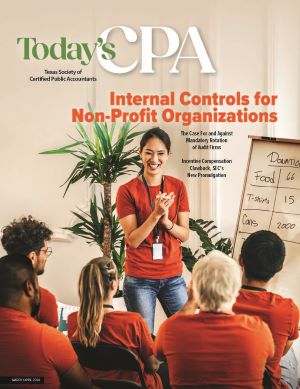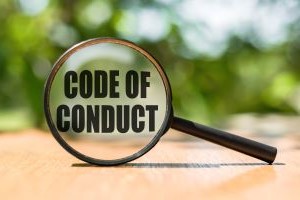March 05, 2024
The Case for and Against Mandatory Rotation of Audit Firms
By Steven M. Mintz, Ph.D.
Audit firm rotation can enhance independence. Even though actual independence may not be compromised, the appearance can be that an audit firm is not independent because of a long-standing relationship it has with a client. It is not unusual for major companies to retain the same auditor for decades, building close-knit relationships that may create a familiarity threat to independence that compromises objectivity. After a period of service, say 20 years, the auditors might become too complacent.
A familiarity threat exists when the audit firm is personally close to the client, especially those in a financial reporting oversight position. It could lead the auditor to overlook differences of opinion with management on accounting and financial reporting issues because of the trusting relationship that develops over time.
Long-standing relationships between the audit firm and a client can also compromise professional skepticism. Auditors might not exercise due care in gathering the evidence needed to make judgments on clients’ assertions. Instead, they may rely too much on the information provided by the client, thereby compromising objectivity and impartiality.
From an ethical standpoint, an unaddressed threat to independence prevents the audit firm from fulfilling its role as an independent third party to investors and creditors, as well as to protect the public interest. Mandatory rotation of the audit firm after a period enhances the likelihood that the audit will be completed in an unbiased manner, grounded in honesty and integrity.
What follows is an analysis of the costs and benefits in the context of onboarding a new audit firm.
Benefits of Audit Firm Rotation
The benefits of audit firm rotation include reducing the likelihood of a conflict of interest. According to the AICPA Code of Professional Conduct, an ethical conflict exists when both of the following are present:
- Obstacles to following an appropriate course of action due to internal or external pressures, and
- Conflicts in applying relevant professional standards or legal standards.
Mandatory audit firm rotation enhances objectivity by enabling the new audit firm to gather evidence and evaluate the accounting and financial reporting of the client with a fresh set of eyes, not encumbered by past decisions. The new firm may pick up on things the previous firm missed or overlooked. It is important that the auditor does not accept client assertions at face value and exercises professional skepticism. The watchword is “trust but verify.”
Auditors are susceptible to judgment biases that can cloud their objectivity. Research commissioned by the Committee of Sponsoring Organizations of the Treadway Commission (COSO) and published in a white paper report, Enhancing Board Oversight: Avoiding Judgment Traps and Biases, identifies the following judgment biases. These biases are based on a judgment framework developed by KPMG and include the following:
- Confirmation Bias – The tendency for auditors to seek or interpret evidence in ways that support preexisting beliefs or expectations. This can lead to overweighting confirmation evidence in the information gathering and evaluation steps and to favor conclusions that are consistent with initial beliefs or preferences.
- Anchoring – When estimating a value, auditors might attach too much importance based on an initial amount and adjust insufficiently away from that value in making their final assessments. Auditors are vulnerable to this bias because they typically begin their process with management-provided data.
- Availability Bias – Occurs when decisions are unduly influenced by information that readily comes to mind or is easily accessible.
The failure to rotate audit firms over a lengthy period can affect some or all these biases.
Costs of Audit Firm Rotation
The costs of audit firm rotation are easier to identify than the benefits. Firms develop an expertise and institutional knowledge over a long-term relationship that enables it to better serve client interests.
By rotating audit firms, the client is likely to incur increased costs to get the new auditors up to speed. The firms would have to screen new clients, become familiar with their operations and develop new audit files. The learning curve when a new audit firm is onboarded is steep. Knowledge of the client’s business and industry, its information systems, decision-making processes, and the results of previous audits will likely lead to a more costly audit.
Another potential cost is that switching auditors may be difficult because only the Big Four auditors do most of the auditing for large companies since they have the resources to audit multinational companies.
Views of Regulators and Professional Organizations
Regulators and professional bodies also consider costs and benefits in determining whether to mandate audit firm rotation. Differences of opinion exist as discussed next.
Audit Analytics recently reported that 18 companies have had the same auditor for 100 years or more. The longest tenure for an audit firm in the U.S. is Deloitte, which has audited Proctor & Gamble for 153 years. The question is whether auditors can maintain their professional skepticism and avoid relationships that may create a familiarity threat to independence when auditing the same client for so long.
The Sarbanes-Oxley Act requires mandatory rotation of the lead audit engagement partner every five years. However, the Act does not mandate audit firm rotation.
Congress considered audit firm rotation in developing Sarbanes-Oxley. The issue was shelved for more study and a 2003 report from the U.S. General Accounting Office concluded that rotation might not be the best way to strengthen auditor independence.
According to a GAO survey, “79% of larger audit firms and Fortune 1000 companies that responded believed that 'changing audit firms increases the risk of an audit failure in the early years of the audit and most believed that mandatory firm rotation ‘would not have much effect on the pressures faced by the audit engagement partner.’ Nearly all the larger firms that responded estimated that initial year audit costs would increase by more than 20 percent.”
In 2011, the Public Company Accounting Oversight Board issued a Concept Release on Auditor Independence and Audit Firm Rotation that revisited the issue by soliciting feedback on mandatory audit firm rotation. According to Lynn Turner, former chief accountant for the SEC and head of the PCAOB subcommittee that recommended mandatory rotation, rotation could “take pressure off the auditors, who would not have to worry as much about losing their firms’ long-standing clients” since mandatory rotation would alleviate the pressure to conform to clients’ desires.
The U.S. Congress got into the mix in 2013 when the House of Representatives passed H.R. 1564, the Audit Integrity and Job Protection Act, legislation that prohibits mandatory audit firm rotation in response to the PCAOB’s concept release statement.
The board received a great deal of pressure from the Big Four firms and AICPA opposing mandatory rotation. AICPA argues that mandatory rotation was costly and could have unintended consequences, including an adverse impact on audit quality. AICPA believes that “mandatory audit firm rotation could limit the audit committee’s ability to hire the most qualified firm to perform the company’s audit. Moreover, they believe that audit committees are in the best position to evaluate the desirability of changing auditors.”
PCAOB received hundreds of comment letters arguing that audit rotation would leave companies with inexperienced auditors and harm audit quality. As a result, the board dropped the issue of mandatory rotation.
Please see below for a summary of the arguments for and against mandatory rotation.
Mandatory Audit Firm Rotation Outside the U.S.
The European Union mandated audit firm rotation in 2016. One goal was to coordinate the 30-member country rules and eliminate the patchwork of different regimes across European countries.
Public interest entities (PIEs) must rotate audit firms every 10 years, although member states have the option to extend the mandatory rotation period to 20 years provided that a public “tender” (i.e., IPO) is conducted at the conclusion of the 10-year period or 24 years if a “joint audit” is performed (i.e., two audit firms sharing responsibility, though not necessarily equally, to produce a single joint auditor’s report). Member states also have the option to set a shorter mandatory rotation period.
The rules are designed to strengthen the independence of auditors and improve public trust in the audit/client relationship. There is still a requirement for key audit partners to rotate after a maximum of seven years, although member states can require a shorter period.
Complying with the new requirements may pose problems for U.S. companies, especially if EU statutory audits are being conducted by the same firm or by a member of that firm’s network performing the audit of the U.S. parent’s consolidated statements.
If a U.S. parent has subsidiaries in the EU, the U.S. parent would not be required to rotate audit firms. However, any U.S. parent company’s EU subsidiary that falls within the definition of a PIE in the member state in which it resides will have to comply with that state’s rotation requirement.
Audit Quality
One of the most important questions in evaluating the pros and cons of mandatory audit firm rotation is whether it could lead to an increase in audit quality. The research studies cited below were conducted in EU countries, because of their requirement for mandatory rotation.
In research conducted that was published in the Spring 2023 issue of the Journal of International Accounting Research, the authors surveyed clients listed on the Frankfort, Germany, Stock Exchange, DAX, to determine whether the anticipation of mandatory auditor rotation creates additional incentives to supply high-quality audits. The authors found that audit quality improves for first-year audits after an auditor change. They level off in the years following the first-year audit for companies not listed on the exchange. However, they do materialize in the second year for listed companies. One conclusion is that competence effects exist following the rotations that may be attributable to the fresh look and enhanced independence.
In another research study that was published in the February 2015 issue of Auditing: A Journal of Practice & Theory, the authors examined companies in Italy, where mandatory rotation has been required since 1975, using private data on audit fees and engagement hours provided by the Big 4 accounting firms in the country. The authors looked at audit costs, finding that they were 7% higher in the final year before rotation and lower by 16% for incoming auditors. However, subsequent fees were abnormally higher and exceeded the initial discount. The authors determined that higher costs were not acceptable after rotation because it did not improve audit quality.
In another study that was published in the July 2015 issue Auditing: A Journal of Practice & Theory, on mandatory rotation and audit quality, the authors determined that focusing auditors on a skeptical assessment frame rather than mandating auditor rotation may be a less costly way to reduce low-effort audits and aggressive reporting.
In its concepts statement, PCAOB cautioned in drawing the conclusion that audit quality suffers following an auditor change. The report notes that at the end of the mandatory fixed-term appointment, the outgoing auditor may not have incentives to perform high-quality audits since they cannot be reappointed.
These and other research results are mixed regarding whether audit quality improves following mandatory rotation. Some research suggests that a strengthening of the audit committee responsibilities can enhance audit quality without the need to rotate auditors. Others suggest that focusing on professional skepticism, which would include objectivity and impartiality, can mitigate low-effort audits.
Results Are Mixed
An important consideration in evaluating the arguments for and against the mandatory rotation of audit firms is whether it would lead to an increase in audit quality. The research results are mixed.
An important question is: Does the attempt to assure greater independence and objectivity outweigh the cost of switching? While audit firm rotation may strengthen the appearance of independence among financial statement users, evidence to support it is lacking.
PCAOB should carefully review the experiences of European Union countries to assess the costs and benefits of rotation. After all, if it is working in the EU then perhaps it can also work in the U.S as well.
Summary of the Arguments for and Against Mandatory Audit Firm Rotation
Benefits of Rotating at Set Time Periods:
- Reduces potential conflicts of interest because of a familiarity threat to independence.
- Provides a check against the lack of independence in appearance because of the ?long tenure of an audit firm.
- Enhances objectivity, impartiality and professional skepticism by getting fresh eyes after a long period of time.
- Counteracts the professional judgment biases that develop over time, including confirmation bias, anchoring and availability bias.
- Reduces the incentive to gain favor with client’s management in order to retain ?the firm.
- Lessens the pressure to support client decisions because of impending rotation.
- Counteracts audit decisions to smooth over problem areas to retain the client over ?the long term.
- Encourages competition and can help to maintain the public’s trust.
Costs of Rotating at Set Time Periods:
- Increased costs for the client to get the new audit firm up to speed since firms develop an expertise and institutional knowledge over a long-term relationship.
- Reduced time horizon over which an audit firm can recover the benefits from acquiring client-specific knowledge.
- Potential reduction in effort during the final year of the audit because rotation is imminent.
- Steep learning curve for the new audit firm to gain knowledge about the client’s business and industry dynamics.
- Limited choices of audit firms that have the resources to audit large public companies.
- Possibility of unintended consequences, including an adverse impact on audit quality.
About the Author: Steven M. Mintz, Ph.D., is a professor emeritus from California State University, San Luis Obispo. He may be contacted at: smintz@calpoly.edu.



















